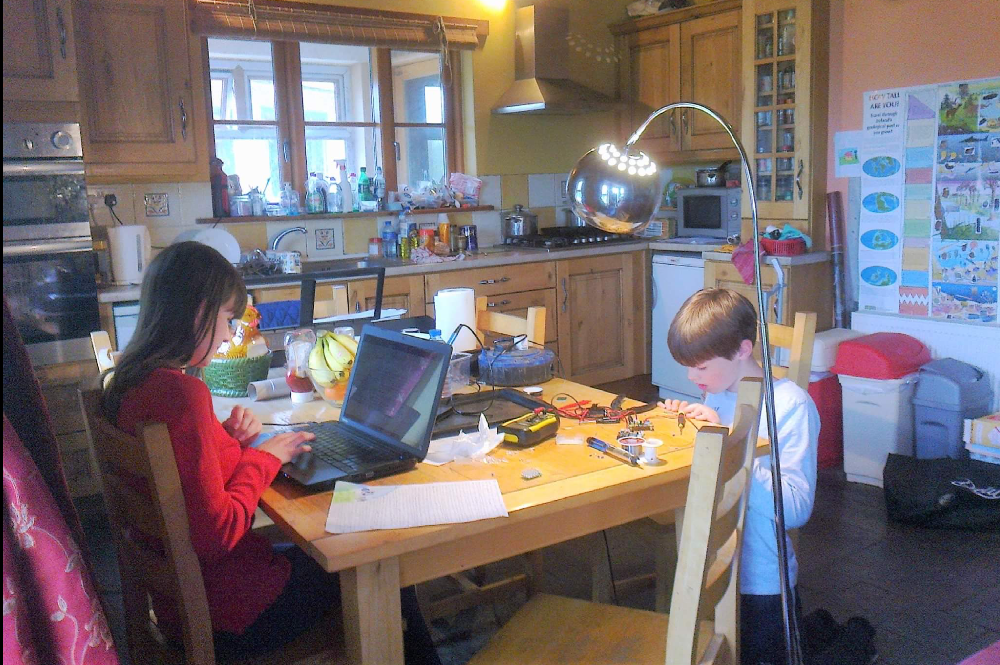Tracy’s story

When I had my first child, I didn’t think about home education as an option. I knew a family who were home educating their children, but I didn’t think it would be for me. I even asked them “what about socialisation?”. Having a child wasn’t going to really change my life, or so I thought.
a child is born
However, once my child was born, my whole outlook changed, and as she approached the age of 3, people started saying “she’ll be starting playschool soon won’t she?”.
I got as far as visiting the local playschool to see about enrolling my child, but there wasn’t anyone there as it was closed on Monday afternoons, and that was as far as my foray into formal education went. It just didn’t feel right to me. I didn’t want to hand my child over to strangers, not yet anyway.
getting started
Then, the home educating family I knew, gave me a leaflet about the Home Education Network Conference. I wasn’t able to go that year, but it did get me thinking. Their children were happy and well adjusted, so the next year, I ventured into a home education meetup in Carlow, and was very impressed, particularly with the teenagers – how social they were, and how well they interacted with the younger children. I made the decision then to attend the next Home Education Network Conference and after that, I decided to give Home Education a try. My eldest was 5 and my second child 3 at this stage.
I didn’t really attend any meetups at first, but I got so sick of people asking me when my daughter was going to start school, and constantly having to defend my decision to home educate, that I started going to meetups regularly to get some much needed moral support.
registration
I registered my daughter with TUSLA once she reached 6 years old. It was quite nerve-wracking. There were 2 assessors as one was being trained, and the trainee queried the fact that my daughter wasn’t yet able to read small words. Fortunately, I was ready with my statistics and able to inform her that Swedish children who begin reading at 7 years outperform their UK peers who begin at 4 years. We were approved for registration.
the right approach
However, when I did begin to teach my child to read in earnest, I soon discovered that phonics weren’t for her, and swapped to the whole word approach. She is now a keen reader with a huge love of books. I’m not sure this would have been the case if she had gone to school, where phonics is the accepted method by which children are taught to read.
She also struggled terribly with maths, and would have been left behind very quickly in a classroom environment.
different learning styles
I registered my son with TUSLA when he turned 6 years old, and at this point we also had an “Ongoing Assessment” for my daughter. Having the 2 assessments done at the same time was an intense experience, but we were well prepared with many examples of learning, from books and games to lego models and art work. My eldest child was more than willing to talk to the assessor and participate in answering the questions he was asking of me.
My son learnt to read using a completely different method to my daughter, where he randomly selected scrabble tiles and used them to make words. He is a born mathematician, but hates maths workbooks, and I realised early on that I would turn him off from maths if I continued to push him to use them. He is now a keen Arduino coder and loves using Computer Aided Design Software, so I know that his maths will develop naturally from using these applications.
a diagnosis
My daughter was diagnosed with dyspraxia (developmental coordination disorder) a couple of years ago. This affects her ability to plan, sequence and deal with abstract concepts, as well as her physical coordination, and probably explains why I never felt she was ready to be handed over to strangers. She is incredibly creative and being home educated has meant she is confident and outgoing. Any of the difficulties she had with reading and maths have been dealt with in our own way, and prevented her from having her confidence knocked. She is currently writing a children’s book, which she plans to turn into a musical animation – not bad for someone who might never have learnt to read!
socialisation
Both my children have opportunities to socialise – my daughter attends singing, drama and dance classes and my son goes to a chess club. In addition, I go to around 3 or 4 meetups a month. Here my children get an opportunity to socialise with other home educated children, and I find them very helpful in reaffirming why I home educate.
However, the highlight of our home education year is Annual Home Education Network Conference (or gathering as it is now called) and I’ve attended this each year since 2009. My children really love being able to spend 3 days with their friends, some of whom they see at local meetups, and others that live further afield.
secondary school?
I always thought my children would go to secondary school, and my daughter turned 13 this year. She decided that she didn’t want to go and is happy at home. She can always go at 16 if she really wants to take her leaving certificate, or she can study for FETAC qualifications if she prefers a different route.
in conclusion
Home education isn’t easy, but it is immensely rewarding. There are ways around any of the problems, and I get a huge amount of pleasure from participating in, and witnessing, the ongoing development of my two wonderful children.
